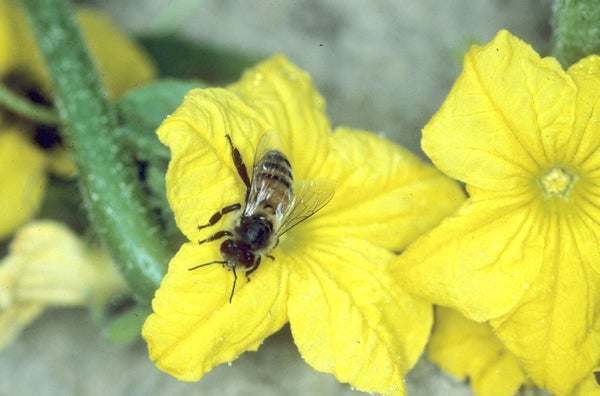Darrell Blackwelder: Vine crops depend on bees
Published 12:08 am Friday, May 15, 2015

- Honeybees are essential for pollinating crops like squash and other vines.
The planting season is about two weeks later than normal but good weather has enticed home gardeners to plant tender vegetable transplants such as cantaloupes, squash and cucumbers the past few weeks. These vining crops or cucurbits are dependent upon insects for pollination and without honeybees and other pollinating insects; these vegetables would not be able to produce fruit.
Some vegetable vine crops have separate male and female flowers on the same plant. Male flowers often appear first followed by the female flowers and are abundant along the vine. The female flowers have a short period to which they are receptive to pollination.
Research shows that the many cucurbit female flowers are receptive to pollen for only 24 hours. If pollination dues not occur, the flowers wilt and shed off. Italian honeybees(the species kept by beekeepers) pollinate flowers generally from10:00 a.m. to 2:00 p.m. during the day. Fortunately, bumble bees and other pollinating bees fly earlier and later in the day.
Pollen from the vine crops is sticky, requiring physical which requires physical movement from flower to flower. It may take as many as 12 visits from honeybees or other insects for proper pollination to occur.
Commercial vegetable producers often rent bee colonies from beekeepers to pollination vine crops. One colony of honeybees (30,000-40,000 bees!) will pollinate an acre of vine crops.
Honeybees require almost perfect weather conditions before flying to pollinate vine crops. The temperature must be above 70 degrees, wind should less than 15 mph and the humidity should be less than 75 percent.
Recently, growers have employed a certain strain of bumble bees to help pollinate crops. These bumble bees will fly and pollinate under adverse weather conditions. Bumble bees of this nature are somewhat expensive and rarely used in this area.
Honeybees have their share of problems with colony collapse disorder (http://www2.epa.gov/pollinator-protection/colony-collapse-disorder)alongwith tracheal and varroa mites have wreaked havoc among beekeepers affecting thousands of hives wjich are lost each year.
Home gardeners must be diligent and protect these beneficial insects to produce good quality crops. Only use insecticides only as a last resort to controlling an insect pest and always read the label before applying any pesticide.
Honeybees are swarming now in Rowan County. Thousands of honeybees follow the queen during her flight as she starts a new colony. A swarm of bees can easily be collected by an experienced beekeeper, if the swarm is in an accessible location. Contact the Cooperative Extension Office at 704-216-8970 for the phone numbers of beekeepers if you should discover you have a swarm of honeybees.
Deadline for research tour is today
The 2015 Rowan County Chamber of Commerce Agricultural Initiative Research tour is Tuesday, May 19. Lunch will be catered by Restaurant Forty Six of Kannapolis. The tour group will depart from Trinity Oaks in Salisbury at 8:30 a.m., returning by 3:30 p.m. The cost for the tour is $25 for members of the Rowan County Chamber of Commerce and $35 for non-members. The deadline to register is today, Friday, May 15. To register or for more information, contact the Rowan County Chamber of Commerce at 704-633-4221 or email cdeese@rowanchamber.com




